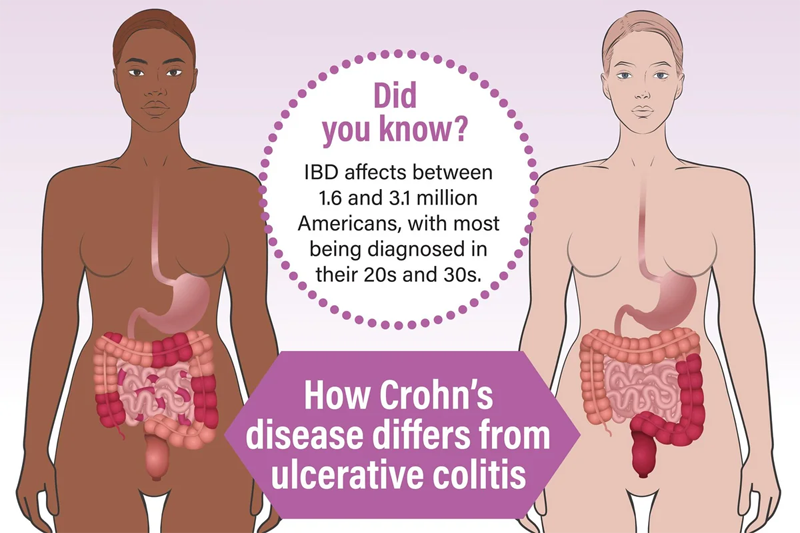Inflammatory bowel disease (IBD) is a term used to describe disorders that involve chronic inflammation of your digestive tract. The two most common types are Crohn’s disease and ulcerative colitis.
*GI tract anatomy image that compares Crohns and Ulcerative Colitis / their affected areas (great example here toward the bottom of the page)*
Did you know? IBD affects about 3 million Americans, with most being diagnosed in their 20s and 30s.
How Crohn’s disease differs from ulcerative colitis
Crohn’s Disease | Ulcerative Colitis | |
Location | Areas of continuous inflammation in the gastrointestinal (GI) tract | Patches of inflammation with some healthy areas in the GI tract |
Inflammation | Inflammation in any part of the digestive tract — most commonly affects the end of the small bowel (ileum) and the beginning of the colon | Inflammation of the large intestine (colon and rectum) |
Symptoms | Abdominal pain, weight loss, joint pain and swelling, fatigue, mouth sores and anemia/iron deficiency | Persistent diarrhea, weight loss, fatigue, bleeding, and urgency to empty bowels (poop) |
Did you know?
Many women delay visiting their healthcare provider (HCP) and go months or years with pain or discomfort. This symptom tracker can help you understand how IBD is affecting your health.
When to see your HCP
Many women find it difficult to discuss symptoms during their visit with their HCP, or they dismiss symptoms as less serious conditions. Every person’s IBD is different, but a conversation with your HCP can help manage symptoms and discomfort.
Look out for these symptoms and make an appointment with your HCP:
Abdominal pain that you would describe as intense, crampy and occurring on and off for weeks or longer
Change in how often you have a bowel movement (or poop)
Chronic diarrhea
Did you know?
Women with IBD are at higher risk for anemia and osteoporosis.
Don’t go through IBD alone
There are support groups available so you don’t have to go through this alone. Support from a community, even online, can help you cope with Crohn’s disease or ulcerative colitis.
















